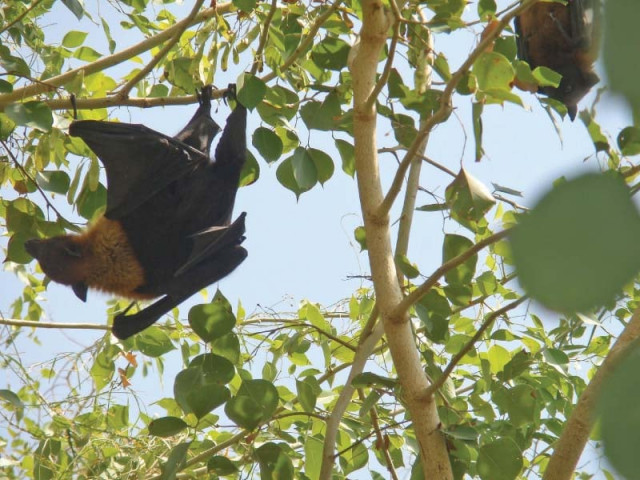Out of nowhere: Megabats take over all the big trees on island
Island is situated in the middle of River Indus near Sukkur Barrage

A megabat hangs upside down on the tree branches. PHOTO: EXPRESS
How the island was formed is an interesting story. Ten out of 66 gates of Sukkur Barrage were permanently closed back in 1942 due to accumulation of large amounts of silt in its right pocket. With the passage of time, silt continued to accumulate and a big island has now emerged with a large number of trees. As the island remains mostly deserted, the megabats have apparently chosen this place as their roosting area.
According to residents, the megabats were first spotted 15 days ago. During a visit to the island, it was observed that bunches of megabats were hanging upside down on the branches. Many branches of the trees had broken down, apparently due to the bats' weight. When they sensed human presence, they started making noise and flew from here to there. However, they did not attack anyone. Apart from adult megabats, juvenile bats were also seen hanging. The size of a juvenile megabat was larger than that of an eagle while the wing span of the adult megabats is around one-and-a-half metres.
Contrary to common perception that megabats attack humans and small birds and animals, it was observed that crows, egrets and other birds were fearlessly sitting near them and the bats were indifferent to them. Nevertheless, they seemed disturbed by and afraid of human presence.
WWF-Pakistan Sukkur chapter senior project officer Imran Malik, who was also present on the island, said that there are many species of the megabats in the world. Contrary to common perception, these megabats do not eat flesh or suck blood, he said, adding that they eat fruits and suck nectar from flowers for their survival. Talking about the behaviour of the megabats, Malik said that they choose such a roosting place where water is available along with a large number of trees. At night, they fly to their feeding place, he said, adding that their nesting place can be somewhere else.
"No doubt these bats cause extensive damage to fruit trees and destroy flowers and soft branches of trees but they are very helpful as well," said Malik. "After eating fruit and other flowers, their droppings contain the seeds of that particular fruit or flower and thus help in spreading the trees at other places." Besides they carry pollen on their wings and body and travel from male tree to female trees, which is the best way of pollination, he added. According to him, governments in developed countries compensate the losses of farmers to discourage the killing of the megabats. However, he added, we don't have such a mechanism here in Pakistan and, therefore, the farmers are afraid of the bats and try to kill them. He appealed to the people, especially farmers, not to kill megabats as they are completely harmless for humans, birds and animals.
Published in The Express Tribune, September 30th, 2016.



















COMMENTS
Comments are moderated and generally will be posted if they are on-topic and not abusive.
For more information, please see our Comments FAQ